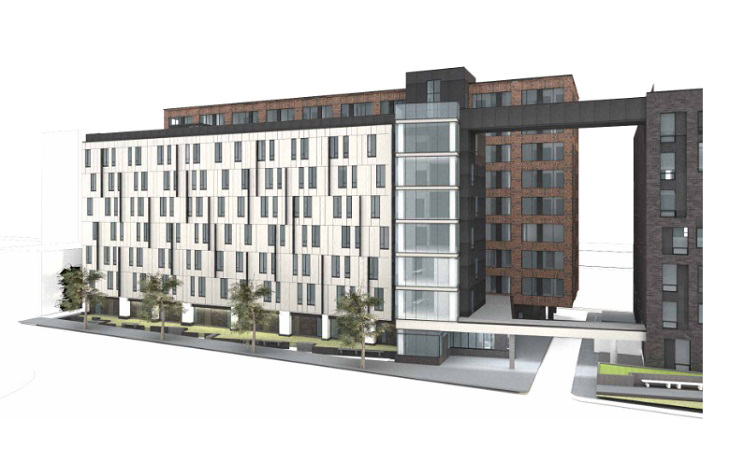An artist’s rendering of the proposed Baumhaus Phase II building, presented to the City Planning Commission on April 19, 2022.
A proposed Baum Boulevard high-rise brings questions from planners, but the city’s leverage is limited.
by Rich Lord, PublicSource
Pittsburgh’s City Planning Commission quizzed would-be developers of a nine-story apartment building in Friendship about proposed rents ahead of a likely May 3 hearing and vote.
Laurel Real Estate Services wants to build Baumhaus Phase II next door to their existing Baumhaus Phase I, at the corner of Baum Boulevard and S. Graham St.
The structure would be lower — just seven stories — along Baum, rising to its full 101 feet in the rear, along Dapper Way. Its 198 units would have 142 on-site parking spaces, and access to the already-occupied Phase I via both a street-level covered walkway and a skybridge between rooftop terraces.
The masonry-heavy design of the ground floor struck commissioner Becky Mingo as “abrasive,” and commissioner Sabina Deitrick as “almost an endless wall of brick.” They asked the development team to review whether more transparency can be incorporated into the facade.
Responding to commissioners’ questions about affordability, the developer’s representatives said Laurel prides itself on attracting diverse tenants. They noted they are subject to market forces, but could end up charging around $2.50 per square foot.
“What would you call affordable?” asked Deitrick. “The 400 square-foot micro [unit] for $1,000 a month? Is that what you’re calling affordable?”
The development team did not directly confirm that example but indicated that they have some unit types priced at around $800 per month in other buildings.
Mayor Ed Gainey has made the development of affordable housing a centerpiece of his economic development agenda. Baumhaus Phase II, however, would not be receiving any of the public subsidies which often trigger affordability requirements, according to the developers. It is not within an inclusionary zoning district, which would require that a percentage of units be affordable to households of modest income.
Attorney William Sittig, who represented the development team, could not be immediately reached after the virtual briefing to address follow-up questions on rents.
The public is expected to have an opportunity to weigh in on May 3. The commission can then approve or deny the plan because it is within the specially planned Baum-Centre district.
Read entire article here

